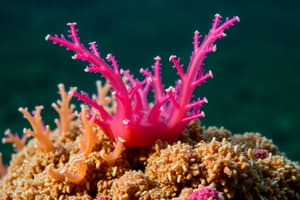Podcast
Questions and Answers
When did paleontological observations begin?
When did paleontological observations begin?
- 5th century BC (correct)
- 1st century AD
- 3rd century AD
- 7th century BC
Who is credited with the establishment of paleontology as a science?
Who is credited with the establishment of paleontology as a science?
- Louis Agassiz
- Alfred Wegener
- Charles Darwin
- Georges Cuvier (correct)
What does paleontology study?
What does paleontology study?
- Life that exists in the present
- Life that existed prior to the Holocene epoch (correct)
- Life that will exist in the future
- Life that existed during the Holocene epoch
How does paleontology differ from archaeology?
How does paleontology differ from archaeology?
What does the term 'paleontology' derive from?
What does the term 'paleontology' derive from?
Which group is mainly fixed and lacks a complex respiratory system?
Which group is mainly fixed and lacks a complex respiratory system?
Which echinoid has Aristotle's Lantern, consisting of 5 calcite teeth?
Which echinoid has Aristotle's Lantern, consisting of 5 calcite teeth?
Which echinoid type is bilaterally-symmetrical and known for burrowing?
Which echinoid type is bilaterally-symmetrical and known for burrowing?
Which echinoid type has podia extending through pairs of ambulacral plates?
Which echinoid type has podia extending through pairs of ambulacral plates?
Which group is mobile and consists of non-stalked forms?
Which group is mobile and consists of non-stalked forms?
Flashcards are hidden until you start studying
Study Notes
History of Paleontology
- Paleontological observations began with ancient Greeks, specifically Xenophanes and Xanthus, who wrote about fossils in the 6th and 5th centuries BCE.
Development of Paleontology
- Paleontology as a science was established by William Smith in the 18th century.
Definition of Paleontology
- Paleontology is the study of fossils and ancient life forms.
Comparison with Archaeology
- Paleontology differs from archaeology in that it focuses on ancient plants and animals, whereas archaeology focuses on human historical artifacts.
Etymology of Paleontology
- The term 'paleontology' derives from the Greek words "palaios" meaning ancient, "on" meaning being, and "logos" meaning science or study.
Echinoid Characteristics
- The group of echinoids that is mainly fixed and lacks a complex respiratory system includes sea urchins and sand dollars.
Aristotle's Lantern
- The echinoid with Aristotle's Lantern, consisting of 5 calcite teeth, is the sea urchin.
Echinoid Types
- The bilaterally-symmetrical echinoid type, known for burrowing, is the irregular sea urchin.
- The echinoid type with podia extending through pairs of ambulacral plates is the regular sea urchin.
- The mobile and non-stalked echinoid group includes sea cucumbers.
Studying That Suits You
Use AI to generate personalized quizzes and flashcards to suit your learning preferences.




